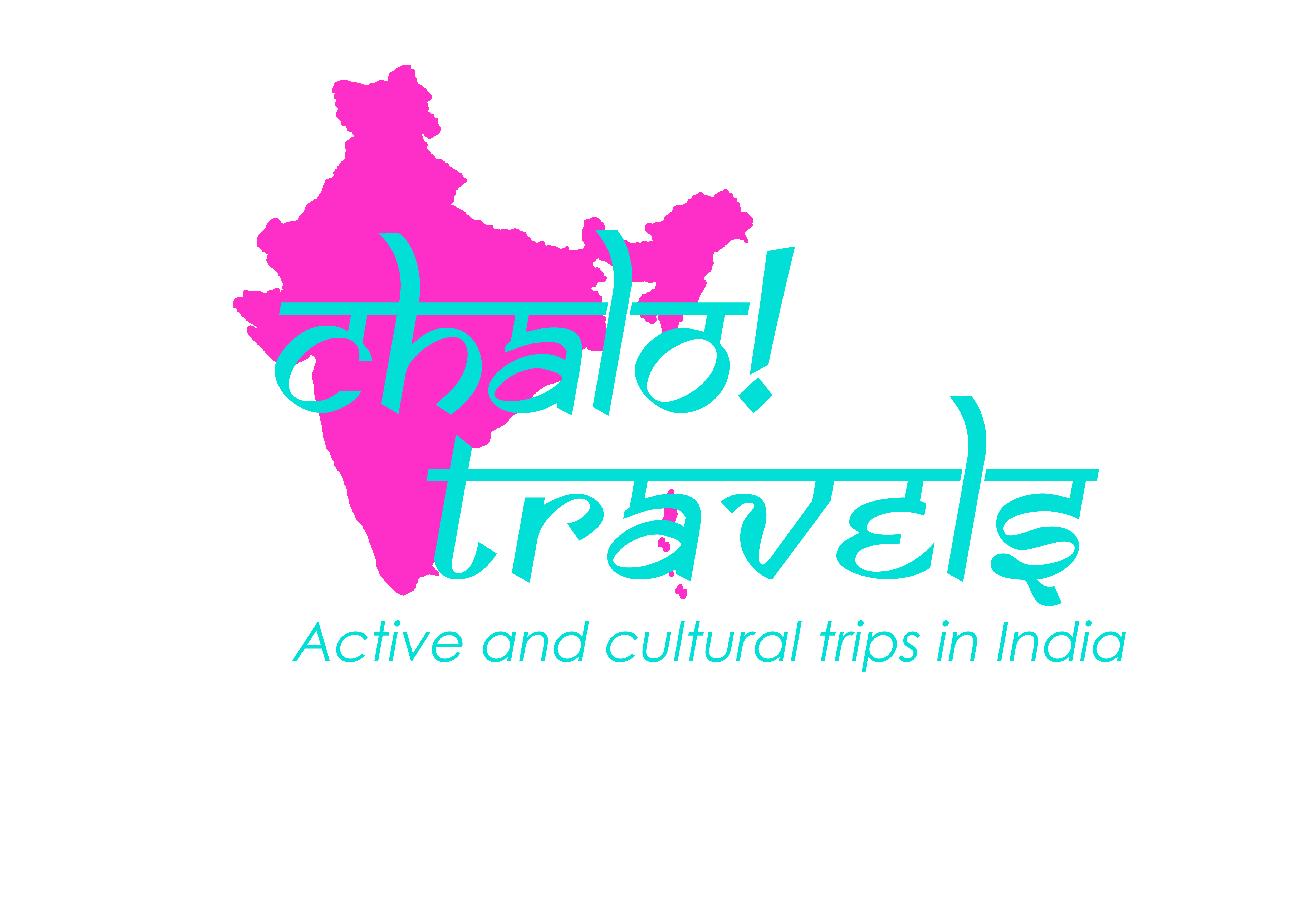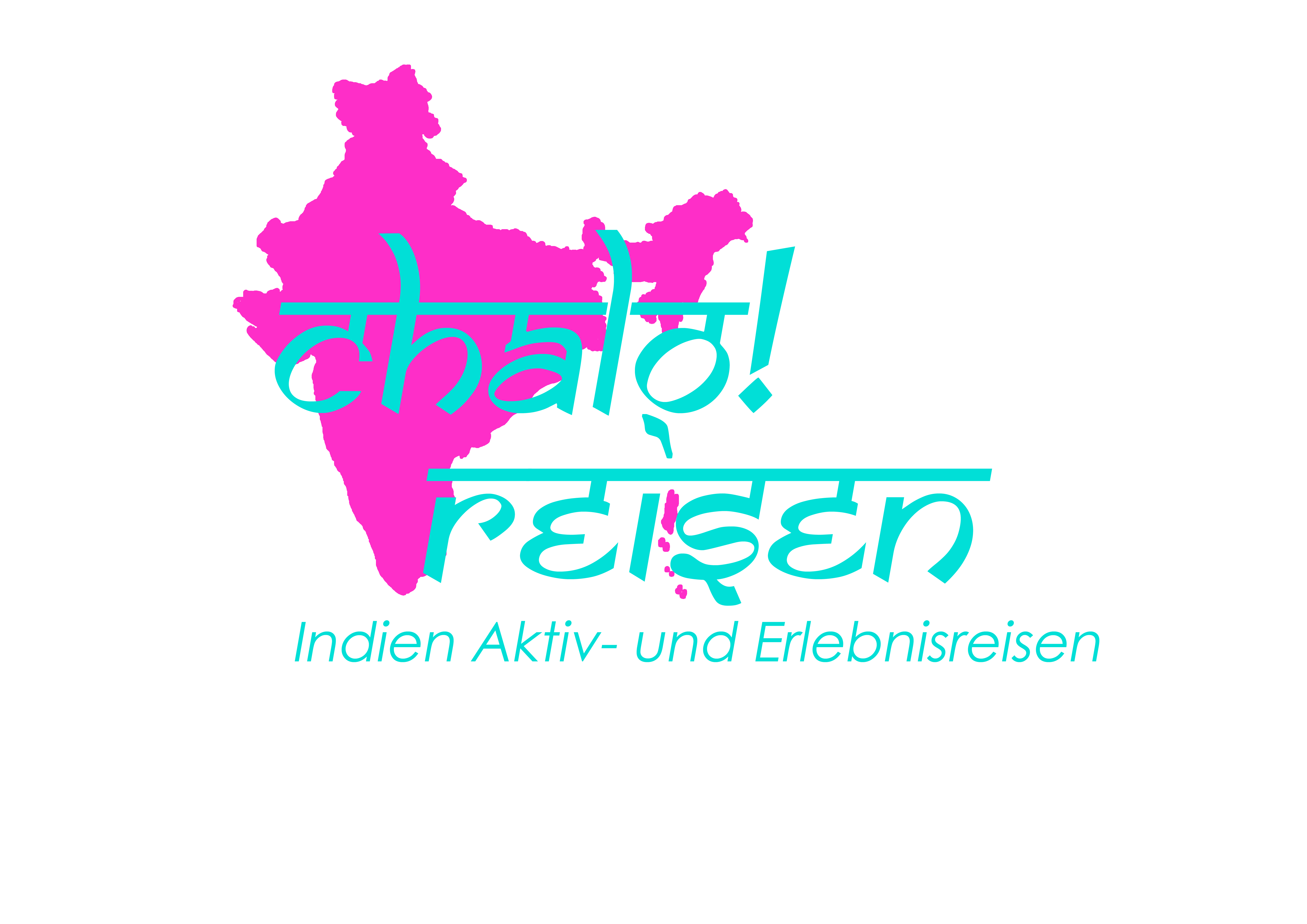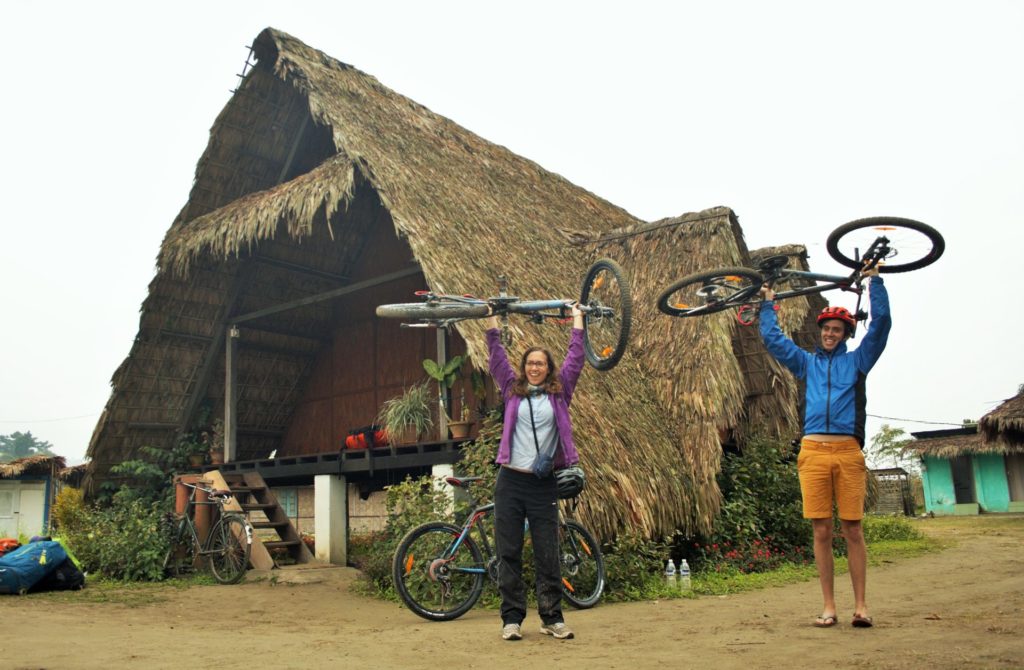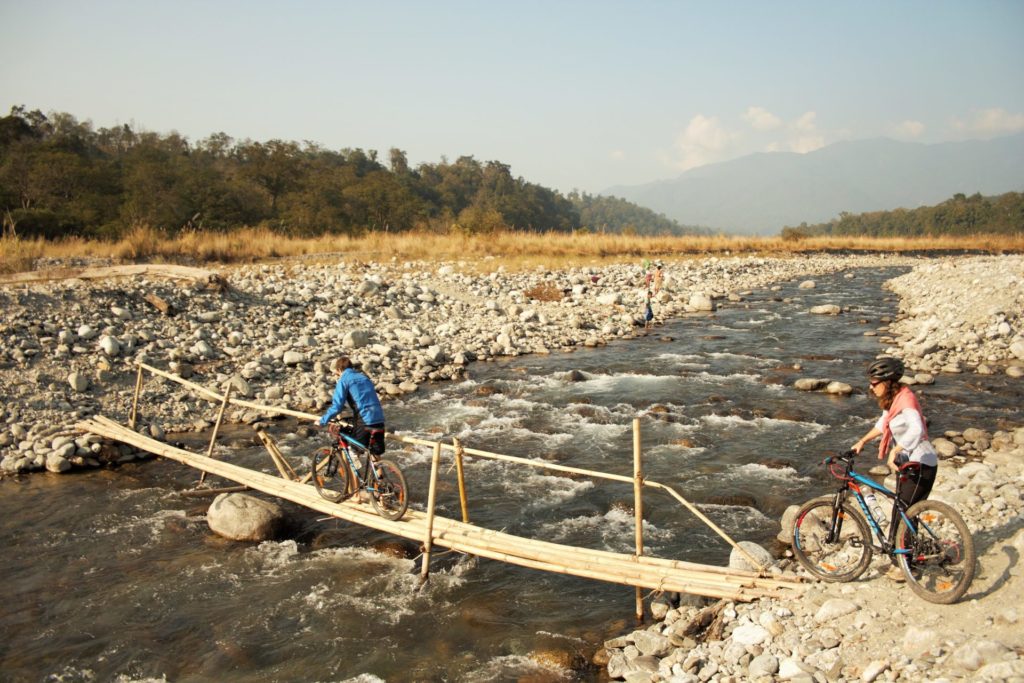- Sport & Abenteuer Reisen
- Fahrrad & MTB
Overview
A challenging bike ride through one of India’s most remote regions. The sparsely populated state of Arunachal Pradesh is located in the very north-east of the low but highly rugged Himalayas. The name means “Land of the Mountains in the Dawn”.
Arunachal Pradesh is the most sparsely populated state in India with only 17 inhabitants per km and the third smallest with an area of 84000 km. Indigenous peoples are mainly at home here. There are more than 100 tribes in the small mountain state of Arunachal Pradesh, which borders the countries of China and Myanmar – many with their own language, religion and culture and some will meet us on our journey through the Himalayan state.
This pilot tour starts in the neighboring state of Assam and leads us into the Acheso valley, where the road ends (if the road continued, we would reach China). During the tour we will drive through the most diverse natural areas Due to the humid monsoon climate, the region is equipped with a tropical-evergreen rain and cloud forest vegetation. The route runs from the oil and tea plantations in Assam, through the tropical forests of Namdaphas and Kamlang, to the grassy landscapes of the Acheso Valley. Every day is a revelation with deep cultural insights and scenic charms.
A follow-up tour through the beautiful neighbouring northeastern states of Assam and Meghalaya with a visit to The Kaziranga National Park to visit rhinos, tigers and elephants, the “living tree bridges”, as well as the green tea plantations of Assam.
Program
Day 1 Independent arrival from your home country
Flight from home country to Kolkata
Day 2 Arrival and Exploration of Kolkata
You will be picked up at the airport and taken to the hotel. The rest of the day we use to explore the surrounding area together.
Overnight: Hotel with breakfast
Day 3 Flight Kolkata – Dibrugarh to Nampakhe
(Also direct arrival possible today from your country to Dibrughar)
Upon your arrival at the Dibrugarh airport, your guide will meet you and you will be further transferred to your accommodation in the Nampakhe Village near the township of Naharkatia. This distance of about 55 km will take us around 3 hrs to complete. Nampahke is the largest of the Tai Phake villages with over 80 households. The Tai Phake are one of the 4 Theravada Buddhist tribes found in the region.
Here we will camp in the lawn of a local household.
Transfer distance: 55 Km / 1.5 hrs
Overnight: Camp
Day 4 Nampahke to Inthong Village
The first day of riding takes you to Inthong Village near the township of Margherita. This distance of about 55km takes you via villages, tea estates and the Dihing Patkai Wildlife Sanctuary. We are in the Tea, Oil, Coal and gas rich region of Upper Assam. Inthong village inhabited by the Singpho People. The Singpho are known as the Jingpaw in China and Kachin in Myanmar, interestingly it was the Singpho who were the first Tea cultivators and Tea drinkers of India. Enroute visit the Oil Museum at Digboi.

Cycling distance: 55km
Overnight: Lodge
Day 5 Inthong – Miao
We take over the rental bikes and leave Inthong in an easterly direction via the mining town of Margherita and the coal region of Assams to Miao, which is picturesquely located on the banks of the Nao Dihing River. Along the way we visit a Tibetan refugee camp, where, in addition to agriculture, they specialize in the production of carpets in demand in the region.

Cycling distance: approx. 75 km Total ascents: approx. 370 m light – medium
Overnight: Eco Lodge in the usual comfortable bamboo huts
Day 6 Miao to Wakro
We break this day into two sections. The first includes riding through village tracks, lying upriver at the fringe of the Namdapha National Park. Whereas, in the second you will be cycling through a narrow forest road skirting the Namdapha National Park and the Kamlang Wildlife Sanctuary. The seclusion of the forest road with a splattering of few Miju Mishmi and Chakma Villages enroute can be a wonderful opportunity to spot birdlife for the ones with keen eyes. Our destination today is the township of Wakro. Wakro (“where the bamboo grows”) is a small township known for its orange orchards and the neighbouring pilgrimage site Parshuram Kund.

Cycling distance: 75 Km
Overnight: Camp
Day 7 Wakro to Tengapani
An easier day as we ride towards the Golden pagoda at Tengapani. For most part we will be riding through forested tracks and then through villages of the Khamti tribe.
This region is home to the Tai Khamti tribe. The Kahmti are one of the handful Tai tribes who are found in India, they are followers of Theravada Buddhism. Your accommodation for the night is adjacent to the magnificent Golden Pagoda. Enroute, we visit the Empong Monastry which is the oldest in this region.

Cycling distance: 50 Km
Overnight: Resort
Day 8 Tengapani to Roing
Another beautiful day of cycling on the best laid roads of the entire tour. Today we leave the region of the Lohit river and make our way towards that of the Dibang, another major tributary of the Brahmaputra. Our destination for the day is the township of Roing lying at the foot of the Mishmi Hills. This is home to the Idu Mishmi tribe. The Idu are one of the three Mishmi tribes who inhabit the northern areas of the Mishmi Hills. Animist in belief, the Idu are one of the smallest Linguistic groups spread between Arunachal Pradesh and southwestern China.

Cycling distance: 72 Km
Overnight: Eco Lodge
Day 9 Roing to 48 Kilo
The short-day distance is amply made up by a 1700 mt climb to our campsite for the day. Once we get out of Roing we climb relentlessly further into the folds of the Eastern Himalayas. The vertical altitude of about 1700mts is gained in 45kms. From today ‘Mithun Gates’ will become common features. These gates are built on the road by the tribesmen to keep the ‘Mithuns’ which are domesticated Bisons from straying across their territory. This section is famous for its birdlife.
Riding distance: 45 Km
Overnight: Camping

Day 10 48 Kilo – Ithun River
All in all, a relaxed day compared to the previous one. Up to the Mayodia Pass we have a steady increase. The pass is one of the easternmost passes of the Himalayas that are passable! Even if the pass is only 2800 meters high, you still have quite a lot of snow up here. During the first 17 km we overcome 750 meters of altitude. After that it goes downhill to Hunli.

Riding distance: 62 Km
Overnight: Camping
Day 11 Ithun River – 173 kilos/Aloya
A hard day awaits us with poor road conditions and short but steep climbs. Nevertheless, it is scenically beautiful and we cycle deep into the Dibang valley. The number of “Mithun steps” increases noticeably, because the resident Idu Mishmi consider the bison as their wealth and the status of the family depends on the number of their fellows. Overnight in the camp

Riding distance: 50 Km
Overnight: Camping
Day 12 Aloya to Agui
Another beautiful yet tough day, with most of this day spent riding along the Dibang and the Dri Rivers. Numerous small landslides with gravel make it a fairly tough going. Today the climbs get longer than the previous day and coupled with the road conditions it makes for probably the most challenging day of the entire ride.

Riding distance: 57 Km
Overnight: Camping
Day 13 Agui to Acheso
The last day of cycling starts with a short but again constant climb all the way till Anini. The road conditions are better than the previous days making it an easier climb in comparison. After the first 18 kms to Anini (Climb) it gets easier with a mix of climbs and downhills all the way into the Acheso valley.

Riding distance: 34 Km
Overnight: Lodge
Day 14 Acheso To Roing
A long day on the road today as we have an almost 12 hr drive ahead of us. We start early at about 5 am and wind our way down to Roing, stopping enroute for breakfast and lunch.
Activity: Transfer: 250 Km / 11 – 12 hrs
Overnight: Lodge
Day 15 Roing to Dibrugarh (Depart) and Flight Home
Post an early breakfast drive to the Dibrugarh airport which is your port of departure. The distance of about 160 Km should take 3 hrs to cover. Enroute you will cross the 9 Km long Dhola-Sadia bridge touted as India’s longest.
Activity: Transfer 150 Km / 3 hrs, Depart
Cycling: 10 Days
Total distance: max. 700 km
Total increases: max. 9,500 m
Difficulty level: medium – difficult
Services
- 14 nights with accomodation according to the mentioned program
- all intra-Indian transfers
- Bicycle rental
- Accompanying vehicle
- Tour guide
- Full catering incl. typical breakfast, water, snacks during the Arunachal Tour, Breakfast only in Kolkata
- special permit
International and domestic flights, which we will be happy to book on requestBicycle Tour Old DelhiVisaInsuranceprivate expenditure
Highlights
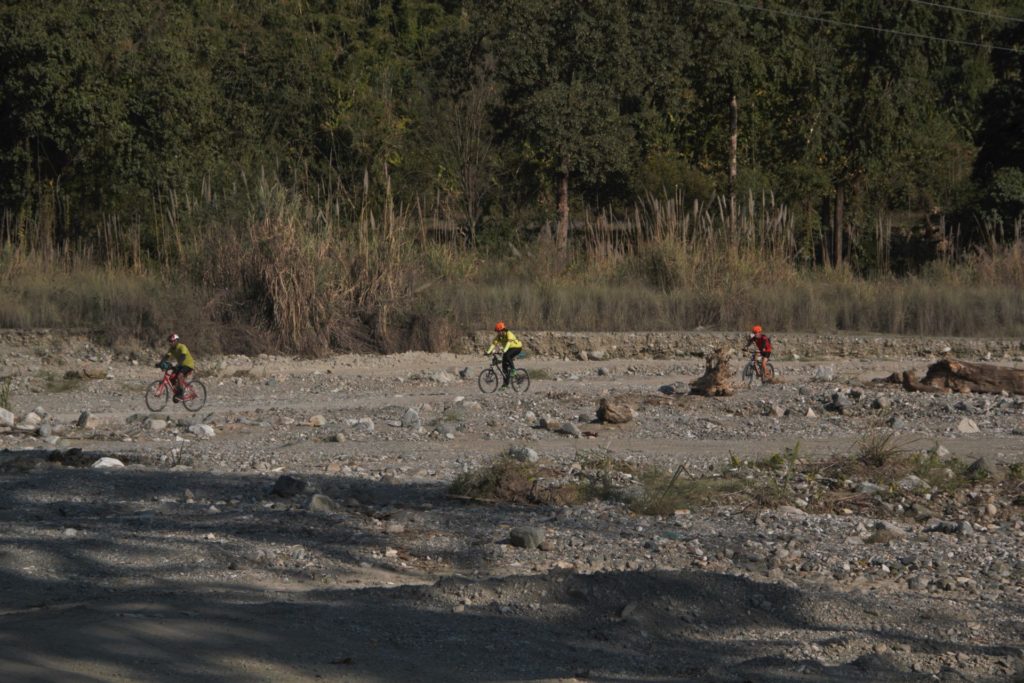
Arunachal Pradesh 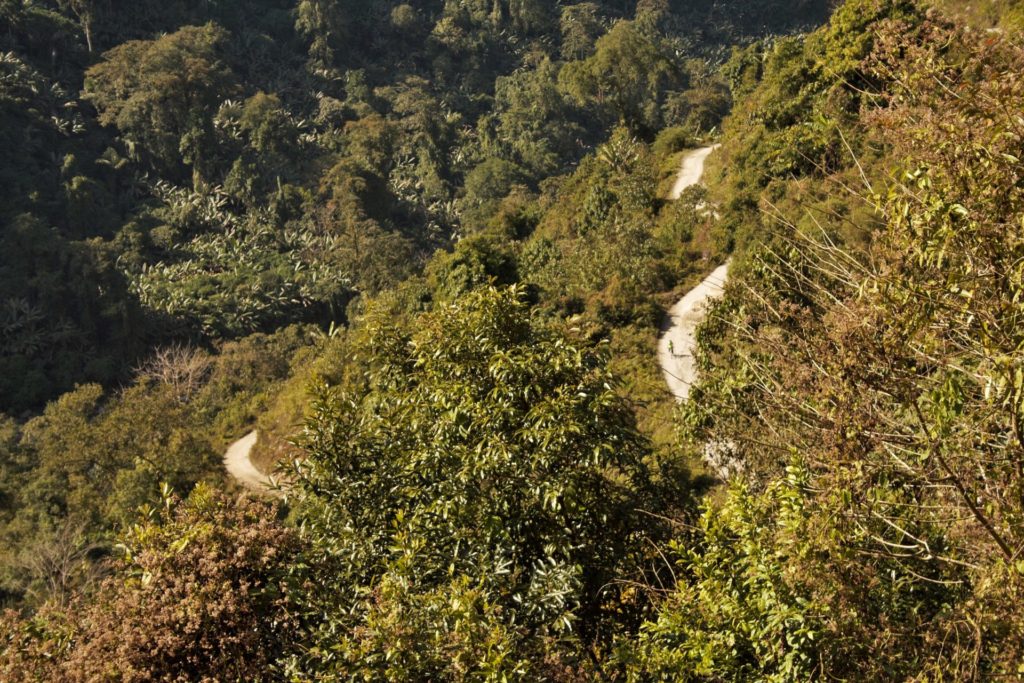
Arunachal Pradesh 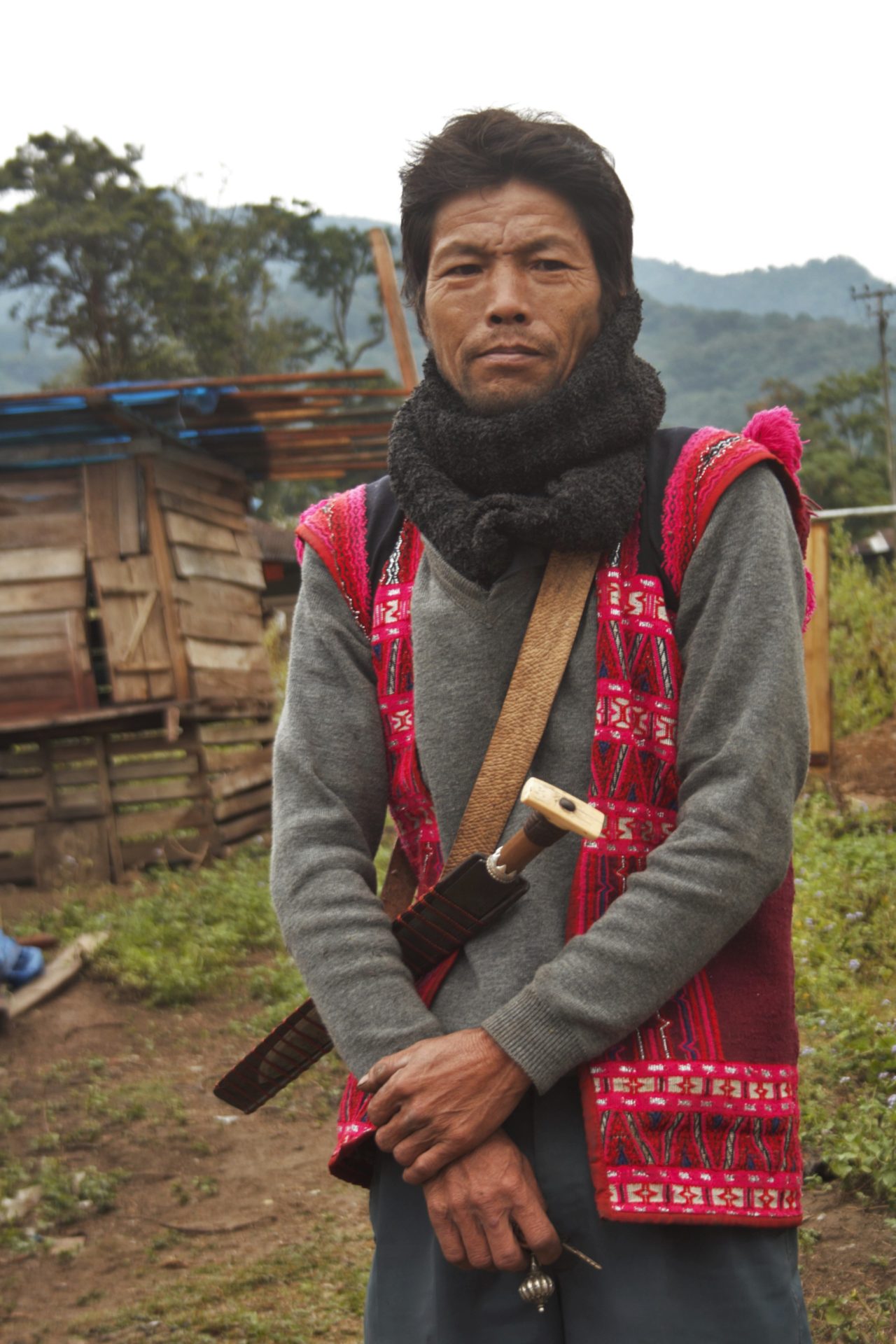
Arunachal Pradesh Tribes 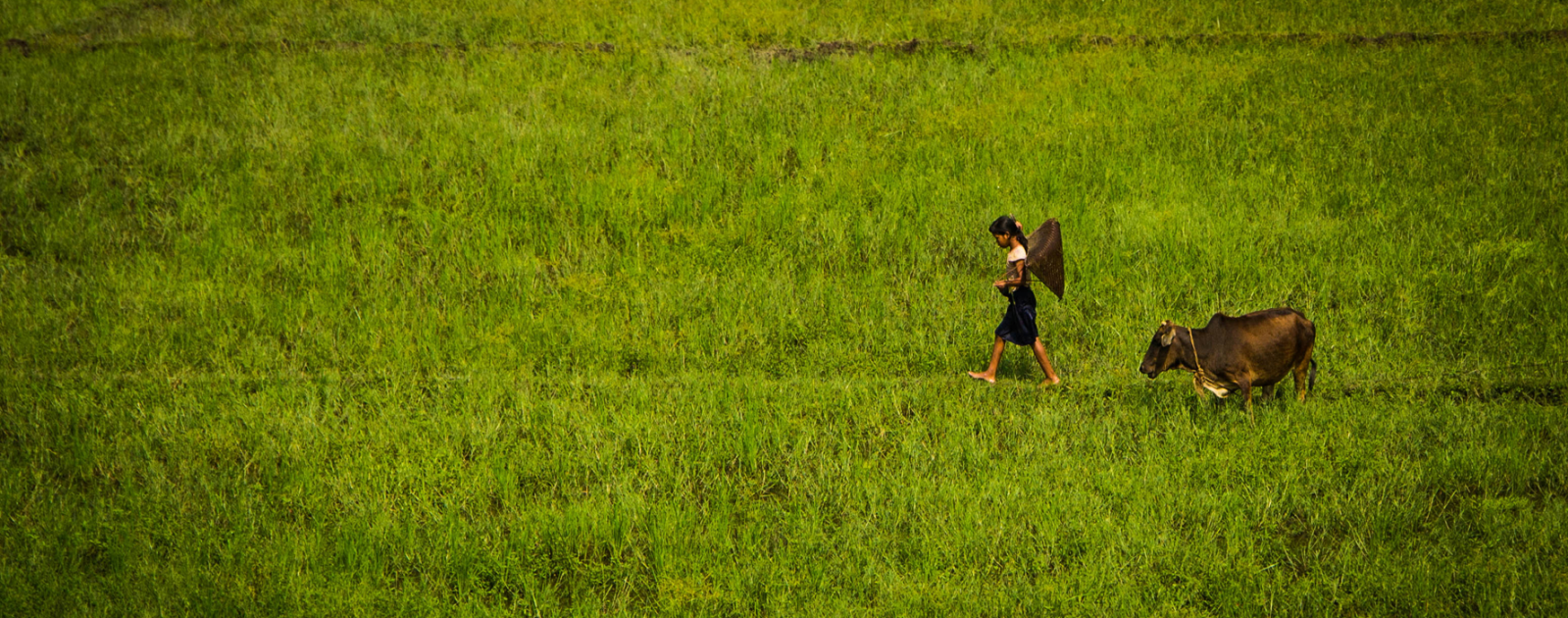
Life of the locals 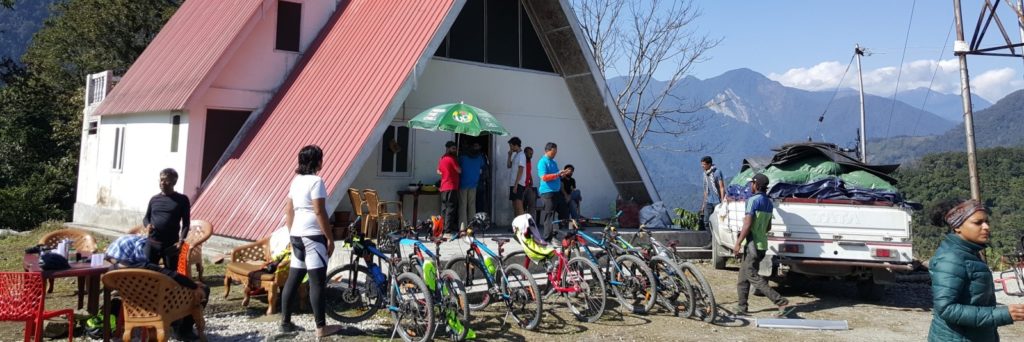
Arunachal Pradesh Bicycle Tour 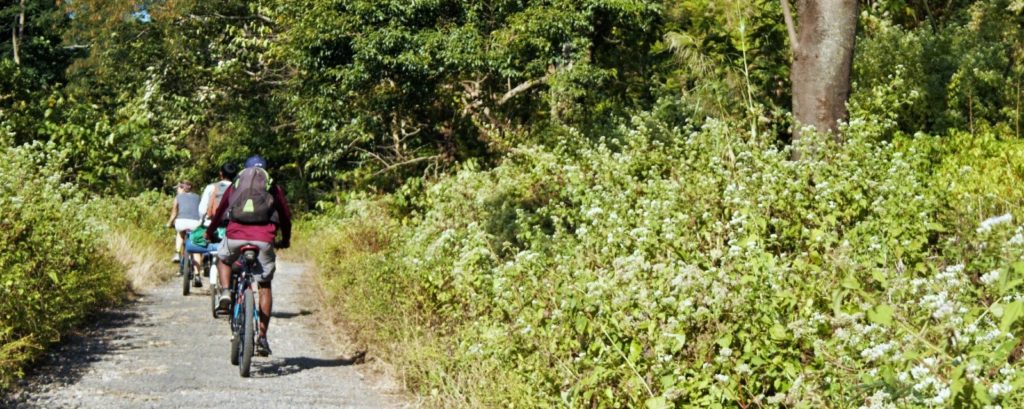
Arunachal Pradesh 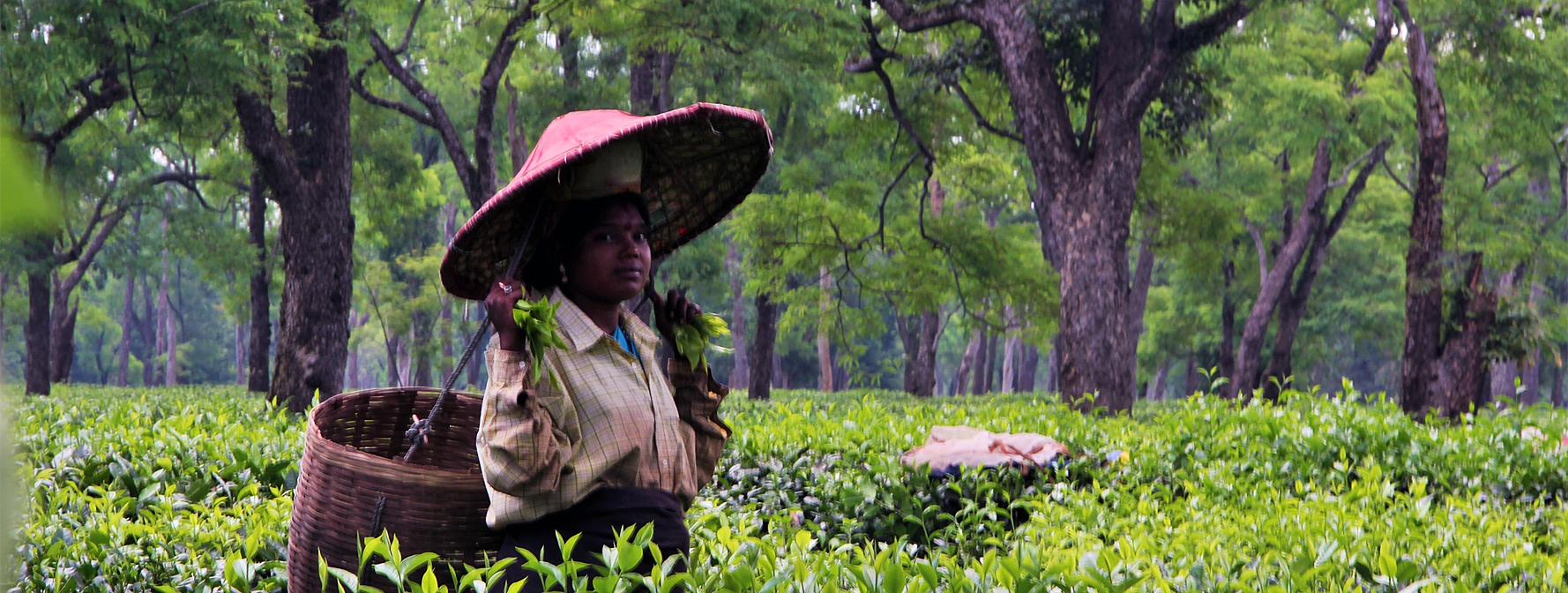
Tea Plantations 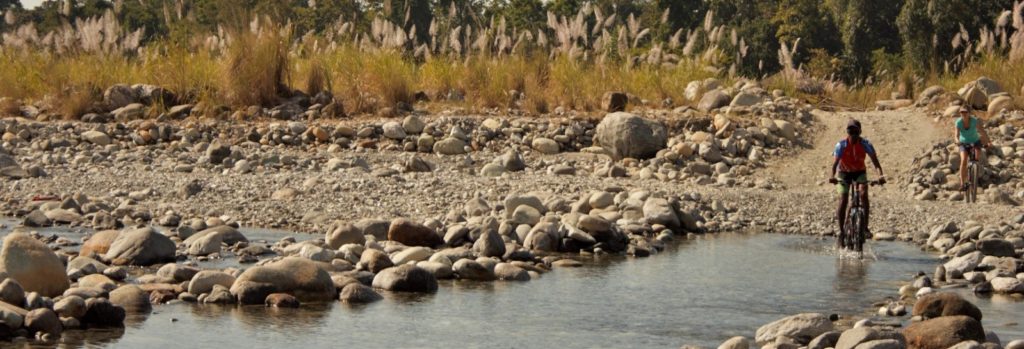
Arunachal Pradesh 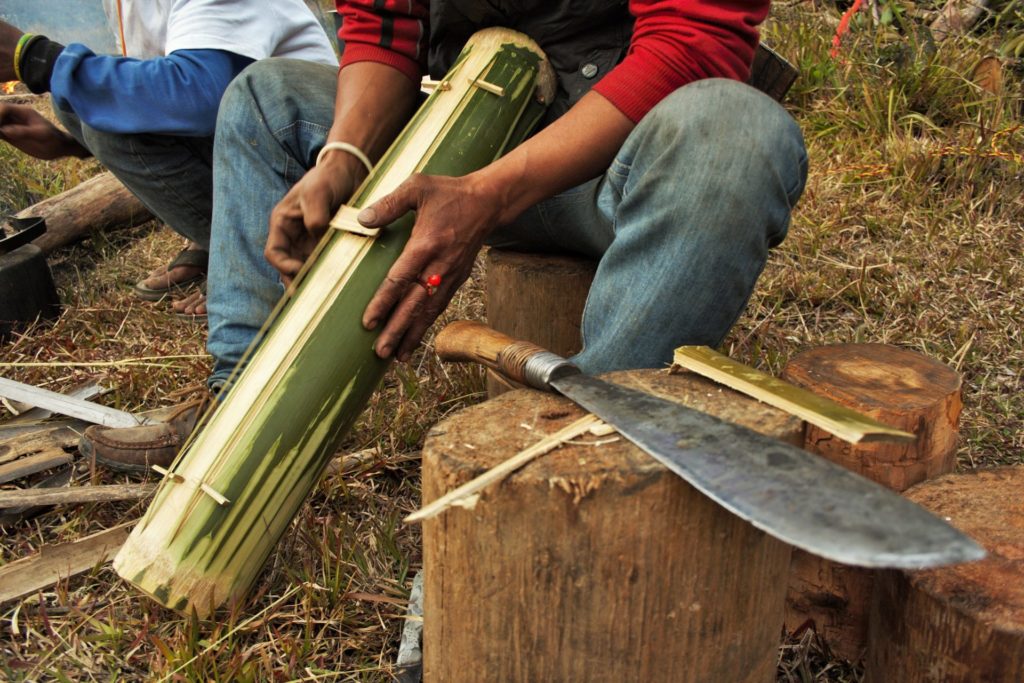
Traditions 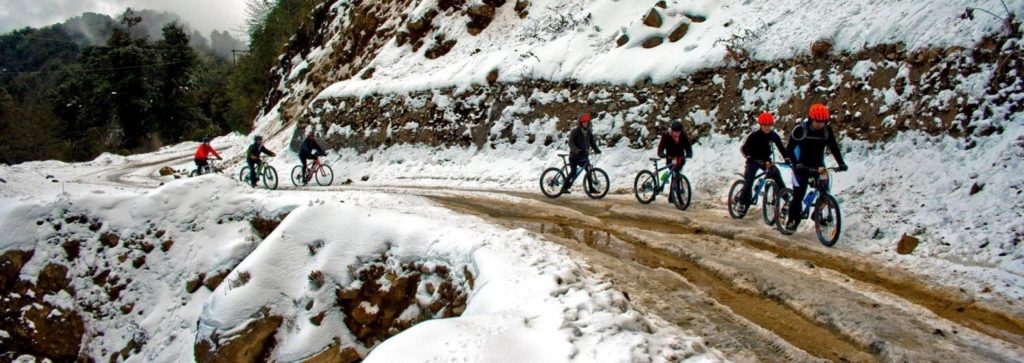
Arunachal Pradesh 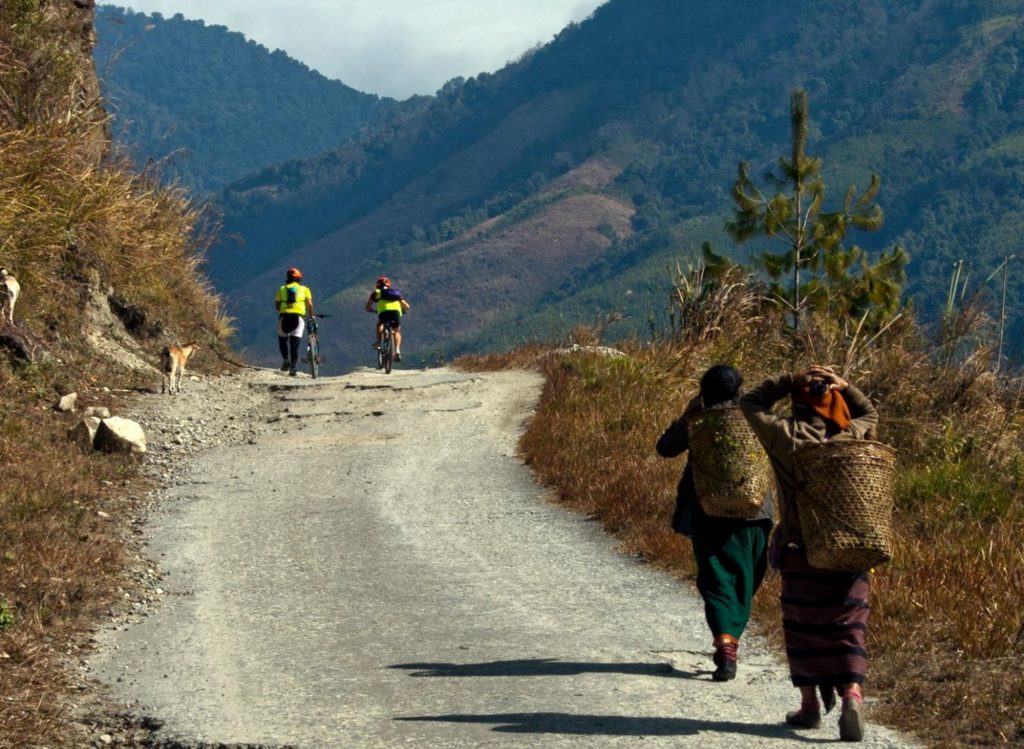
Arunachal Pradesh 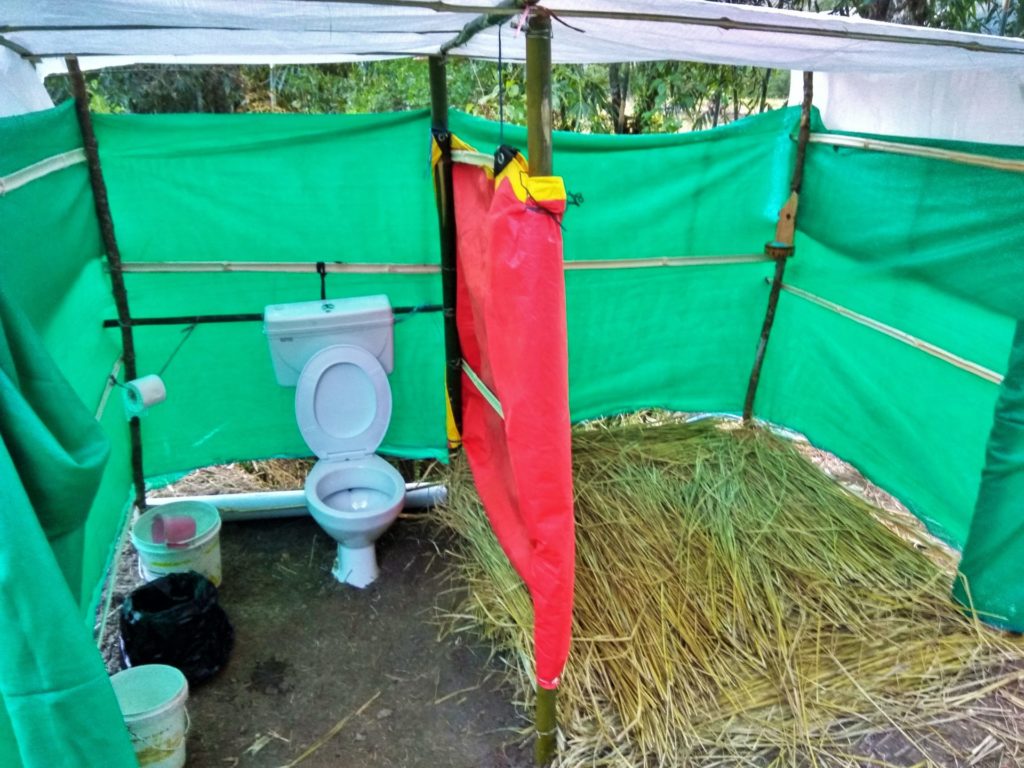
Camp 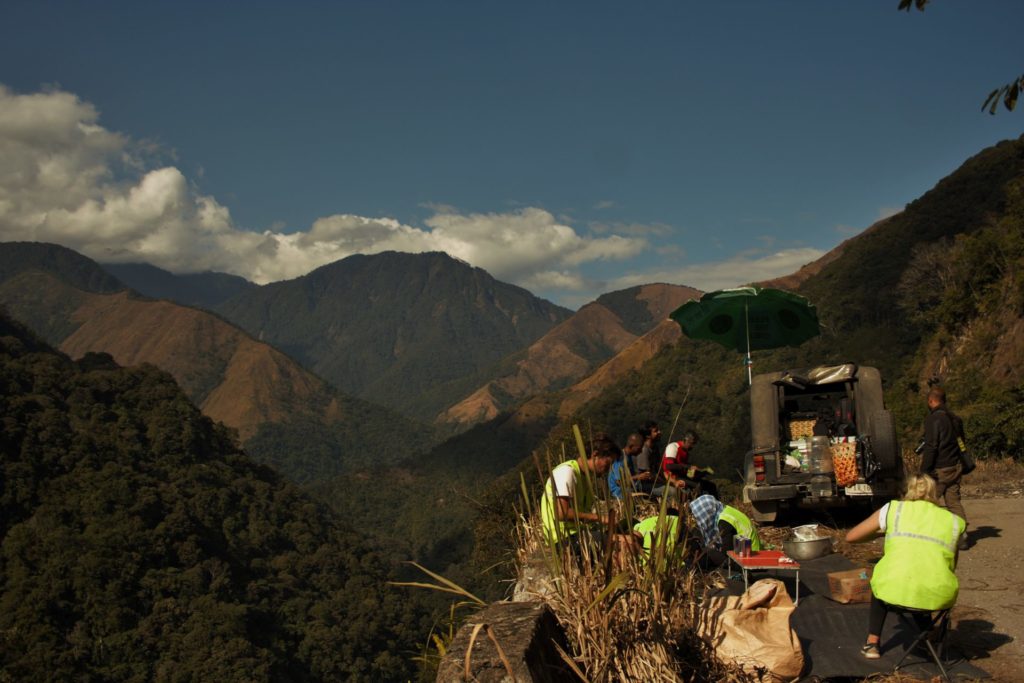
Break 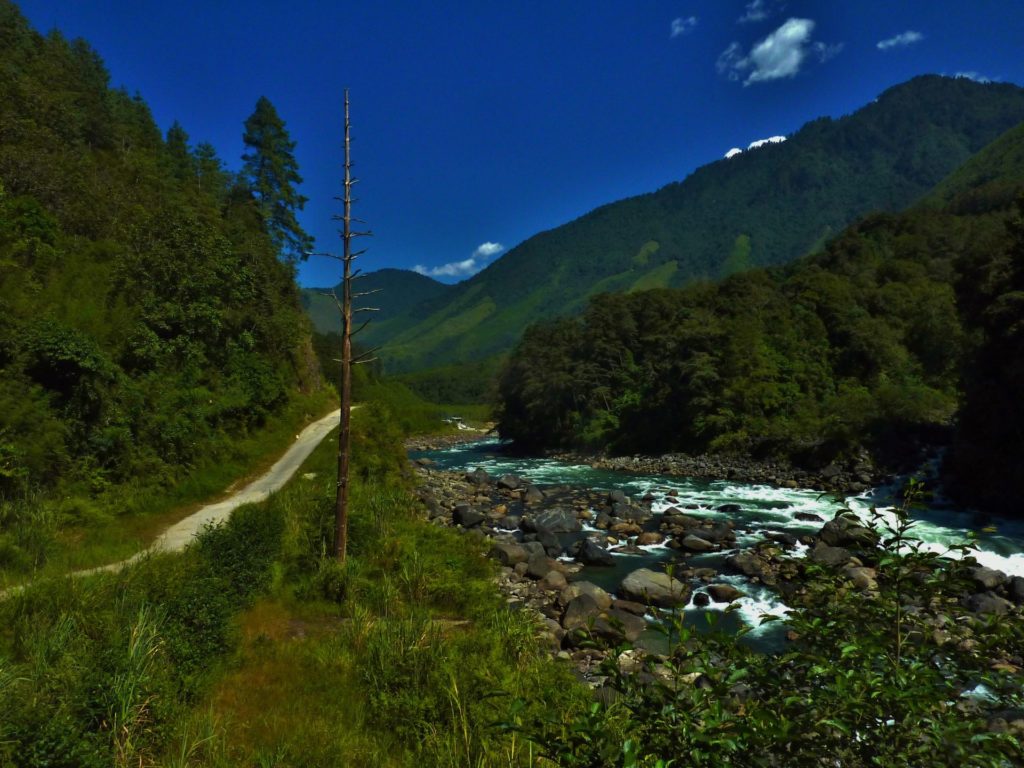
Arunachal Pradesh 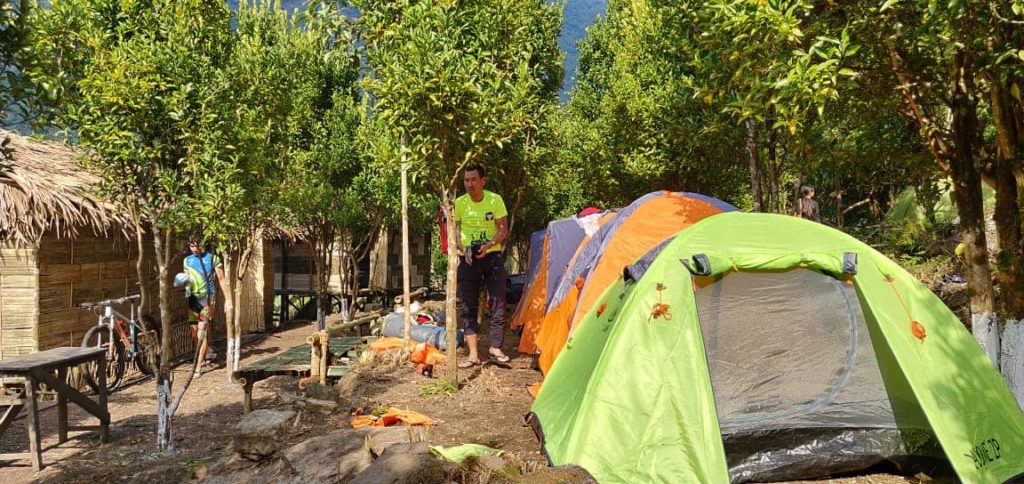
Camp 
Shop 
Traditional Huts 
Meals 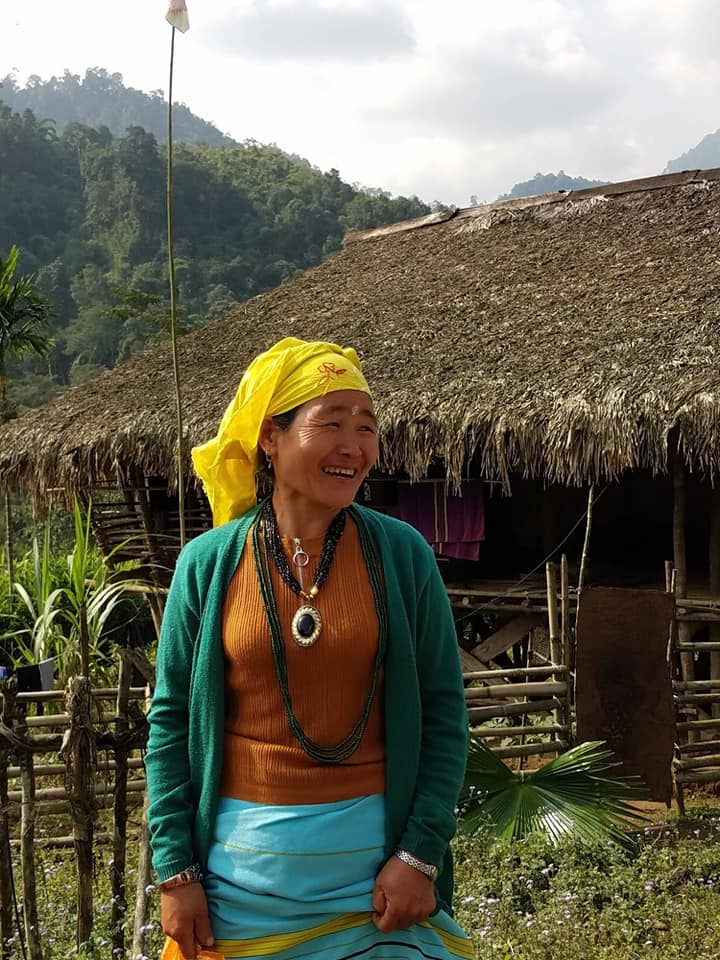
Locals 
Village 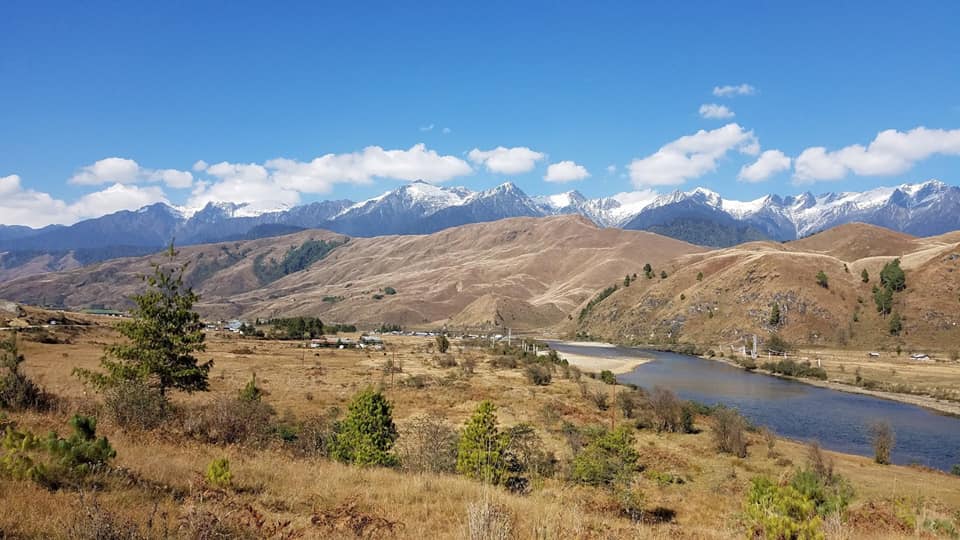
Arunachal Pradesh 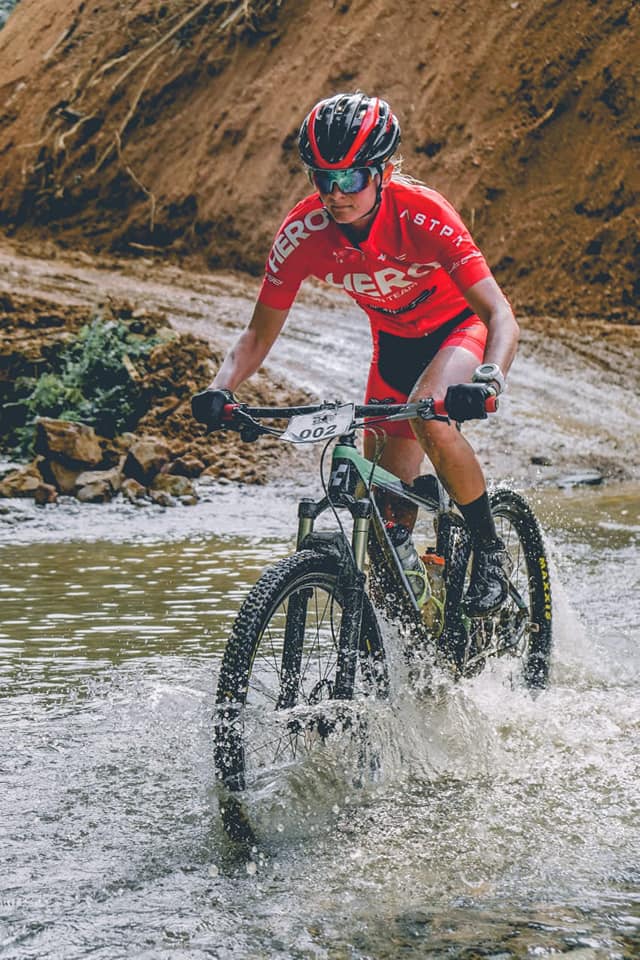
Arunachal Pradesh 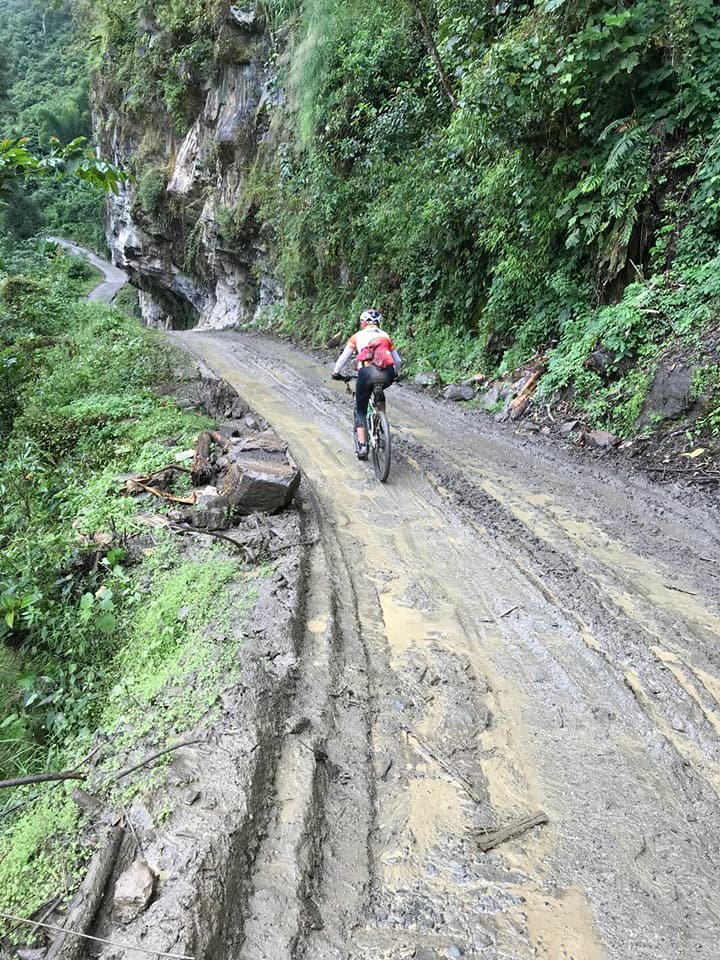
Arunachal Pradesh 
Arunachal Pradesh 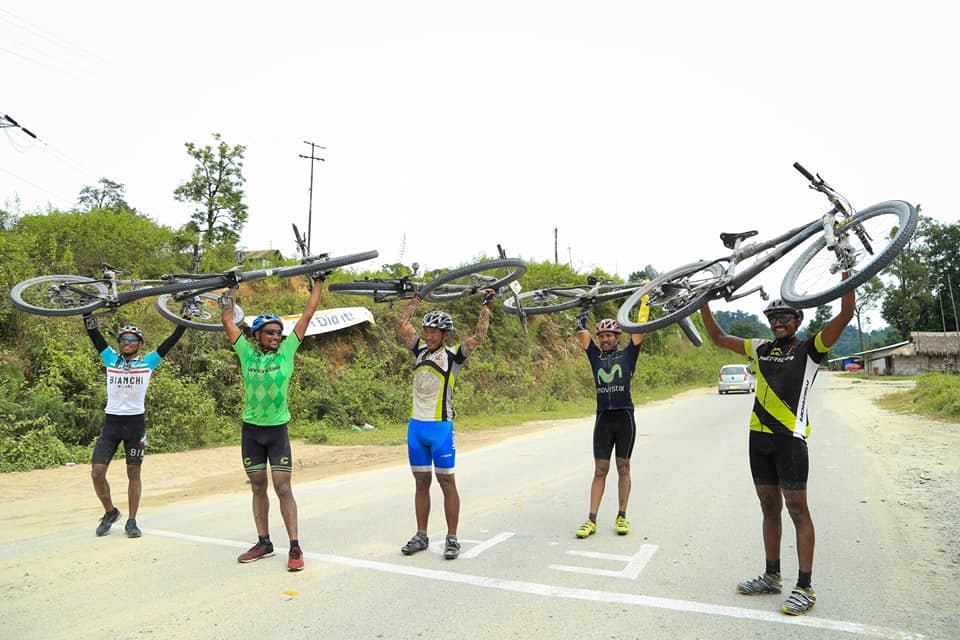
Arunachal Pradesh 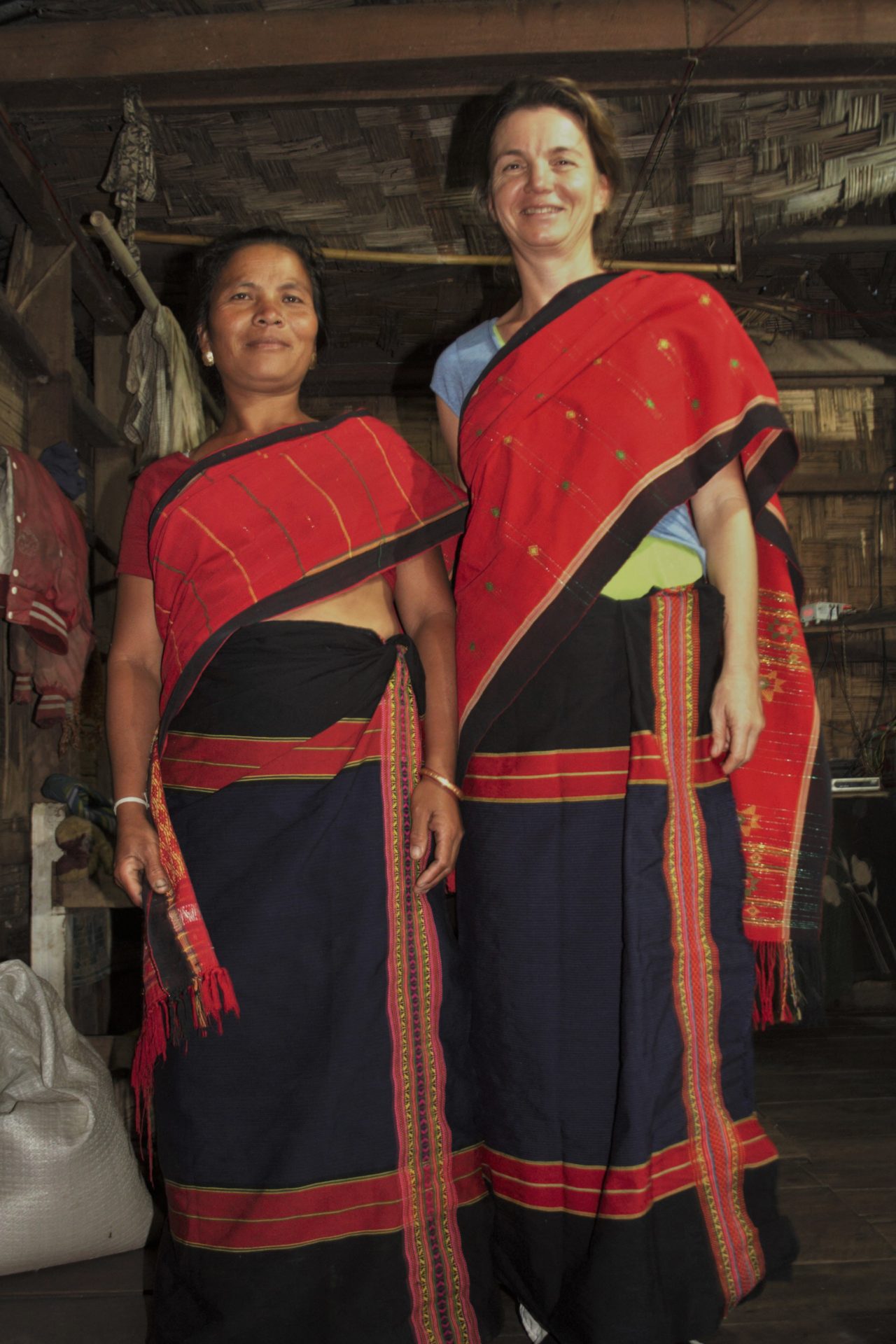
Tradition 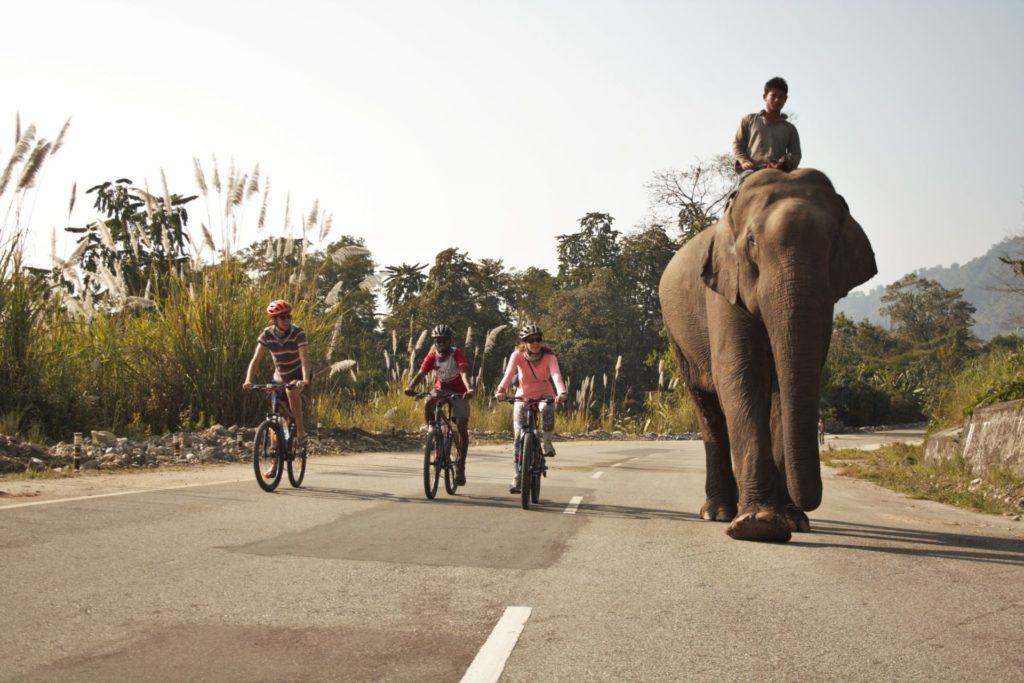
Interesting Acquaintances 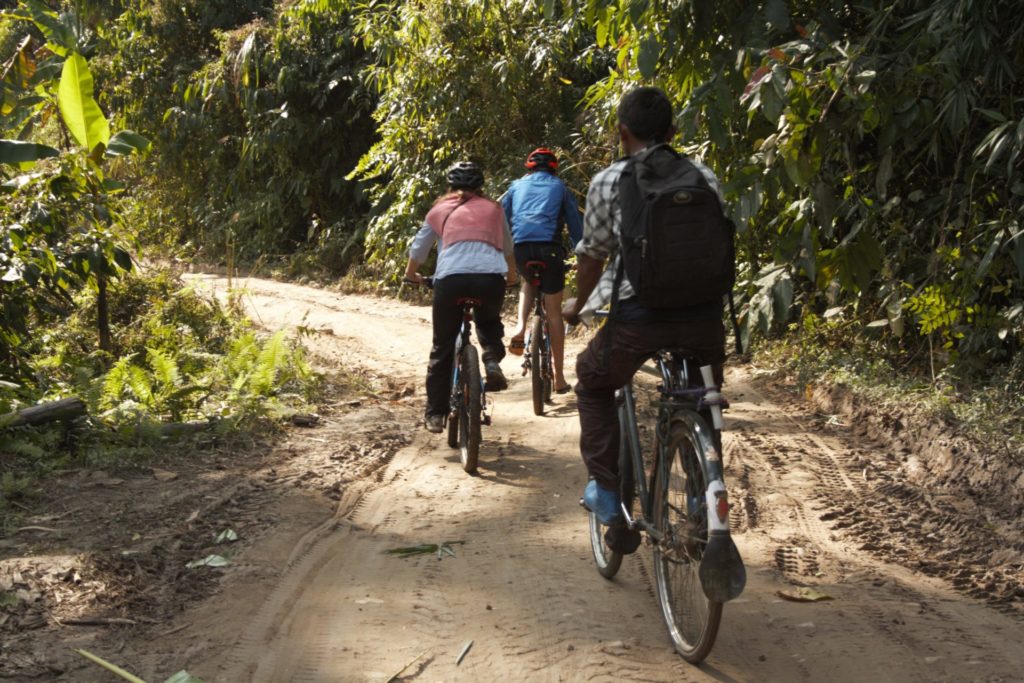
Arunachal Pradesh
Prices and Dates
Best time to visit: October- April
18.04.2026 – 02.05.2026
Price per person from 4 participants
2200 € (excluding flights) single supplement 350 €
(a trip of 2 people or more is possible, please make a separate request)
Tour Info
Requirements
The long journey, the route profile, the routes themselves, as well as the seclusion of the tour make this trip challenging overall.
You should be mentally and physically fit. Flexibility, openness and a step out of the comfort zone are part of this journey and then it can become something very special.
The roads are in a wide variety of condition – from sandy jeep track, to well-developed tar roads. In some cases, the ascents are quite long and steep.
Information about our Bicycle Tours in the Himalayas
1. Guide and team
On all our bike tours we have at least one (for larger groups of 6 participants two) mountain bike guide and mechanic with us, who take care of our guests and their bicycles.
Our all guides speak English.
In addition, there is a local team consisting of a chef, helpers, drivers.
All our team members have been working with us for years, are very friendly and always strive to prepare our guests for a great Himalayan experience. Their English is rather mediocre or non-existent, but this is not necessarily a hindrance to communicating with them.
2. Bicycle routes
The bike routes are designed for the skills of our guests and are all feasible for a person with a good fitness level, unless otherwise mentioned. The daily routes are between five and eight hours long (with breaks) and an average increase of around 500-800 metres of altitude is completed.
In between, rivers may have to be crossed or crossed. The roads range from well-developed tarmac roads to stony jeep slopes. The ascents are moderate, but long, with the long descents up to 50 km one should exercise caution. The roads are connecting roads and are also used by tourists in cars, motorcyclists and trucks. Traffic is moderate, but you should be careful. In India, the left-wing driving commandment applies. So it would be better to give priority to all other road participants.
3. Bicycles
We provide you with our own trek or Scott bikes. These bicycles are rental bicycles. We have bicycles in the sizes “Small” and “Medium” and also some bikes with a large frame. All bikes have hydraulic brakes and nine-speed gear. Otherwise, you can also use your own bike. Helmets are mandatory.
4. Daily Routine
7: 00 am Get up with tea
7:30-8:30 am Breakfast
7:00-9:30 am Dismantling of the camp
8:00- 9:30 Start Tour
1:00 pm Lunch on the way
3:00-17:00 Arrival at the camp and camp construction
15:30-17:30 Snacks
19:00 Dinner
6. Luggage
Each tour participant is responsible for taking personal clothes and items with him. We are travelling with escort vehicles and the luggage will be transported with it. A small day backpack for the camera and something to cover can make sense. The escort vehicle will always be close to us. Click here for the packing list for our bike tours in the Himalayas.
7. Meals
During the tour there will be a vegetarian full catering. Water is either boiled or we have a water filter with us.
Breakfast (daily selection):
- Coffee/Tea
- Oatmeal porridge/muesli/cornflakes/Indian porridge
- Indian Breakfast/Toast/Eggs/Jam/Butter/Cheese/Honey/Chocolate Spread
- Sliced fruit/vegetables
Lunch (mostly lunchbox), sometimes warm in the camp
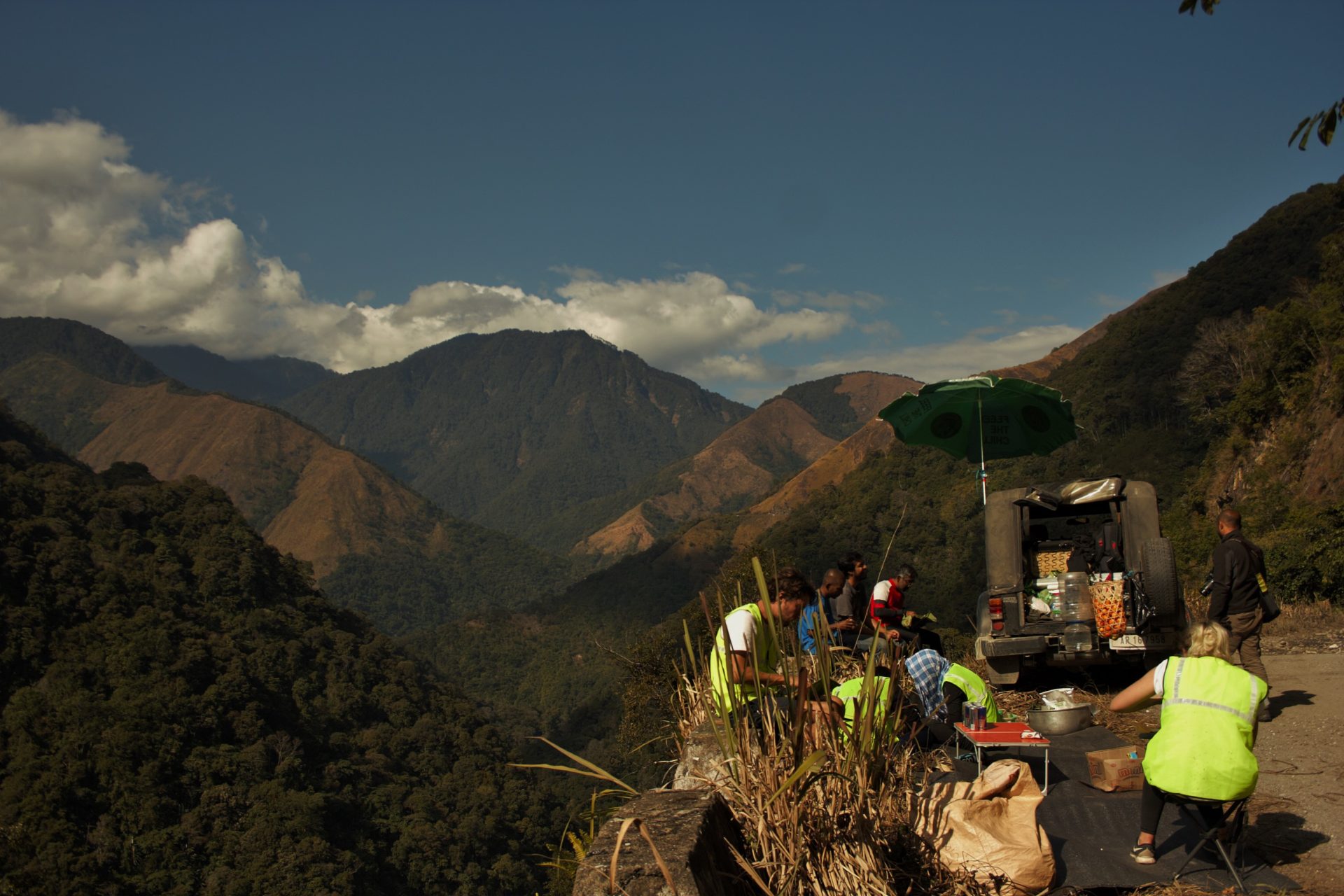
- Sandwiches/Indian (rice, chapati, vegetables)/eggs/potatoes
- Juices
- Chocolate
- Fruit
Snacks
- Tea/coffee
- Cookies
- French fries/Indian snacks
Soup
Dinner ( Mix of Indian/Chinese/Continental)
- Vegetable dish
- Lentil dish
- Rice/noodles
- Chapati
- Salad
- Dessert
8. Accommodation and Camp
On this tour we are partly housed in simple lodges in Eco farms, partly in our own camps in tents. Please prepare for very simple accommodation in Arunachal.
The lodges are small cabins of various facilities, all with an attached bathroom with hot water.
Due to the seclusion of the region, there are not everywhere fixed accommodation, but we travel with our own camping team and camping equipment.
The team prepares our temporary camps before our arrival. We will sleep in three-man tents for two, and we will also have a kitchen tent, a dining tent, as well as toilet and washing tents with hot water in buckets.
9. Weather
In the Himalayas, temperature fluctuates widely. While it can get warm up to 25°C during the day and the sun is not only warming but also very intense (sun protection is a must), it can also cool down significantly below the minus degrees at night, especially in the months end of September and October, as well as in June. There may also be weather changes with snow on the passes. Sometimes it can also get very windy.
